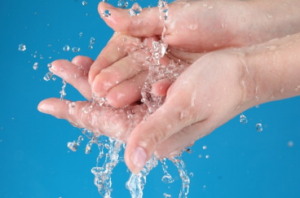By Susan Terkel
 Good hygiene is one of the most important habits to acquire. In the days before “germ theory” was developed, in the late 1880s, the connection between good hygiene and good health was not generally understood. Yet some cultures stressed cleanliness and purity, even without an understanding of how important hygiene was to good health—and, indeed, their populations were often healthier and lived longer.
Good hygiene is one of the most important habits to acquire. In the days before “germ theory” was developed, in the late 1880s, the connection between good hygiene and good health was not generally understood. Yet some cultures stressed cleanliness and purity, even without an understanding of how important hygiene was to good health—and, indeed, their populations were often healthier and lived longer.
Today, we know it is important to wash our hands, faces, and bodies, and to brush our teeth. We know this helps to protect us from germs that can make us sick. Thus, one of the roles of a parent is to teach the child the importance of hygiene. Most parents understand the value of hygiene, but not all parents know exactly what to do or how to convey that value or teach that habit to a child.
Washing hands. Washing hands regularly can dramatically reduce germs, because washing with ordinary soap and water, for only 15 seconds, and drying hands with clean towels can kill as much as 99.9 percent of germs. This translates to staying healthier, getting sick less frequently and, perhaps, even recovering more quickly and fully.
That is because widespread use of anti-bacterial soap is increasing the rate of resistance to antibiotics.
To sum up this advice: wash your infant’s hands often, and, later, teach your children exactly how to wash their own hands, and you will have taught them an important lesson in hygiene and healthy living. And remember that habit for yourself!
Washing genitals. The intestines, and therefore stools, harbor countless infectious germs in the body. It is important to keep those germs from traveling into the blood stream and other parts of the body. This means that washing your hands before and after changing a diaper, and keeping stool from entering your child’s urinary tract (or mouth) is vital. It also means wiping, then washing a girl’s genital area from front to back, and washing a boy’s genitals, with soap and water are vital. Later, it means teaching your child healthy habits: washing their hands after they use the toilet, and when they take a shower or bath, washing the genital area with soap and water.
 Dirty diapers, especially those with loose stools, can easily allow germs from the stool to enter the urinary tract and cause an infection. That infection can spread to the bladder, or worse, to the kidneys. While girls, with shorter urinary tracts, tend to get more urinary tract infections (around 10 times more), boys tend to get more serious infections.
Dirty diapers, especially those with loose stools, can easily allow germs from the stool to enter the urinary tract and cause an infection. That infection can spread to the bladder, or worse, to the kidneys. While girls, with shorter urinary tracts, tend to get more urinary tract infections (around 10 times more), boys tend to get more serious infections.
Boys with foreskins get more urinary tract infections than boys who have been circumcised, in part, because the genitals of boys with foreskins are slightly harder to clean than those without them. This is especially true of younger babies, whose foreskins have not separated from the glans.
The advice here is to change diapers frequently. Wash your hands and wash your child’s genitals with soap and water, remembering to go from front to back for girls. It’s a good idea to avoid letting a daughter linger in dirty bathwater. And, it is important to keep the bathtub clean, since bathtubs are one of the most germ-harboring places in a home (ditto for kitchen and bathroom sinks and faucets).
Later, teach a daughter to wipe herself from front to back, thus keeping germs from her anal area and from feces away from her urinary tract. And teach a son how to keep his genital area clean, mainly by washing it with soap and water – regularly.
To sum things up. The medical community and health educators and many parents are recognizing the value of hygiene—especially hand washing and genital hygiene. They have learned that good hygiene habits are effective, inexpensive, and simple ways to prevent infection and disease—but only when they truly become everyday habits.
– Susan Terkel studied Child Development at Cornell University, and has written over 20 books on medical and social issues. Recently, she coauthored an award-winning book, The Circumcision Decision: An Unbiased Guide for Parents, which helps expectant and adoptive parents make a decision to circumcise their son or leave him intact. She also coauthored Small Change: It’s the Little Things in Life That Make a BIG Difference, a book about habits to acquire or to give up.
